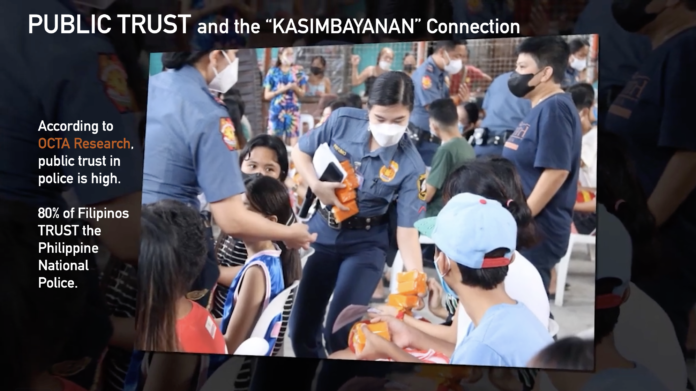Community trust is a vital component in maintaining a safe and harmonious society. Within this framework, the police force plays a crucial role in upholding law and order. However, trust is not automatically granted; it must be earned through positive performance, seen in a high sense of police legitimacy and community engagement. In this paper, the writer emphasizes the importance of community engagement in fostering trust between the police force and the community they serve. Furthermore, it will establish the relationship between the MKK=K principle and its operational framework, “KASIMBAYAN,” introduced by ex-CPNP Azurin, and its role in enhancing the considerable public trust in the police force.
Community engagement refers to the active involvement of police officers in the communities they serve. Philosophically and strategically speaking, in community policing, it is the framework’s core. It goes beyond law enforcement and involves establishing meaningful relationships, understanding community needs, and working collaboratively to address them. Through community engagement, police officers become more than just enforcers of the law; they become trusted partners and allies. When police officers engage with the community, they create an environment that fosters positive performance. By actively participating in community events, building relationships, and listening to community concerns, officers gain a deeper understanding of the needs and expectations of the community. In addition to active participation in community events, establishing relationships, and listening to community concerns, police officers must focus on the ordinary individuals encountered on the streets. This includes ambulant vendors, fish and vegetable vendors in public markets, public utility jeepneys (PUJ), and tricycle drivers. These individuals are integral to the community, acting as its everyday eyes and ears. By being attentive to their needs and asking about their well-being and any challenges they may be facing, police officers can forge closer connections and better serve the community. This relationship enables police officers to tailor efforts and initiatives to perform better and protect the community while strengthening a network of information on these community people, where intelligence needed lies in the web of information these people possess.
In Philippine policing, contemporary efforts have been made to strengthen community engagement within the conceptual framework established by former Chief of the PNP, PGen Rodolfo Azurin Jr, MKK=K. Notably, the “KASIMBAYANAN” operational framework embodies this approach, where field-level policing emphasizes engagements centered around the “Simbahan” or Church to foster stronger connections with the “Bayan” or people. While some may have criticized the former CPNP’s concept, its merit speaks for itself, representing a standard model of 21st Century Policing as observed in more developed nations. Moreover, these initiatives align harmoniously with domestic laws such as RA 8551 and the 1987 Philippine Constitution advancing the police force that is civilian in character and a community and service-oriented agency. Before the retirement of CPNP Azurin on April 24, 2023, the OCTA Research Group surveyed from March 24-28, 2023, revealing a high level of trust in the PNP despite the recent controversies surrounding the organization. The survey results, published in May, highlighted that an overwhelming majority, or 80% of respondents nationwide, expressed their continued trust in the PNP, while only five percent indicated a lack of confidence.
High levels of community engagement directly contribute to strengthening trust between the police force and the community. By being visible, approachable, and responsive to community needs, officers demonstrate their commitment to public service. This proactive approach helps dispel negative stereotypes and biases, promoting mutual respect, understanding, and cooperation. Community engagement facilitates effective communication and collaboration between the police force and the community. Regular meetings, town halls, school PTA meetings, and outreach programs provide platforms for open dialogue and exchanging ideas. This fosters a shared responsibility as community members shape the policing strategies and initiatives implemented in their neighborhoods. Community engagement contributes to effective crime prevention and problem-solving efforts. When police officers are actively engaged with the community, they gain valuable insights into local issues, which allows them to address potential problems before they escalate. Collaborative problem-solving approaches, such as community policing initiatives, build trust and lead to more effective outcomes.
Community engagement is pivotal in earning community trust for the police force. The implementation of the “KASIMBAYANAN” operational framework by retired CPNP Azurin demonstrates a significant link to the establishment of public trust, as evidenced by the survey published during the tenure of its implementation. At this level, officers can build bridges and establish meaningful connections through active involvement, positive performance, and a commitment to understanding and addressing community needs. This trust not only strengthens the relationship between the police force and the community but also leads to more effective crime prevention and problem-solving outcomes. As we strive for safer and more cohesive societies, prioritizing community engagement remains essential for fostering a mutually beneficial relationship between law enforcement and the communities they serve. Where an open line of communication exists, all problems or issues are easy to resolve before they become a crime.
by: Byron Filog Allatog
________________________________________
DISCLAIMER:
The views expressed in this article are those of the author. They do not necessarily reflect the position of the Philippine National Police, the Armed Forces of the Philippines, or the Philippine Government.
CSOP101 is a professional learning site for community policing advocates, practitioners, and supporters in changing the policing landscape. It is likewise an issue-based, related to or addressing nation-building. The views expressed within individual blog posts (police blog and academic) are those of the author and do not reflect any official position or that of the author’s employers. Any concerns regarding this blog post or resources should be directed in the first instance to byron.allatog012@gmail.com.

